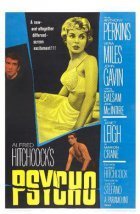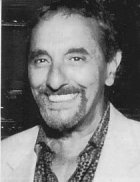
Psycho Page #11
- R
- Year:
- 1960
- 109 min
- 861,057 Views
EXT. THE PORCH
As Norman stands in the doorway, he is suddenly and blindingly
lit by the bright headlights of a passing car. The flash of
the lights and the SOUND of the SPEEDING CAR are over in a
flicker of a moment, but it takes a few seconds for Norman
to regain his former tense composure. Then he goes to the
car trunk, raises it with his foot, throws the suitcase and
the pail into it, slams it shut. He pauses a moment, then
realizes he has left the bathroom light on in Mary's cabin.
He returns to cabin. As he enters, his eye is caught by the
newspaper on the bedside table. He goes to it, takes the
newspaper, and looks once again into the bathroom. His glance
goes right over the toilet bowl.
He turns out the lights, crosses the darkened cabin, goes
out onto the porch.
He reopens the trunk, tosses in the newspaper and closes it.
He goes around and jumps into the car and starts away.
We HOLD on the trunk, follow it for a while, then
DISSOLVE TO:
The car pulls away from a CLOSE ANGLE on the trunk and as
CAMERA HOLDS we see that we are now in a swamp area.
It is quiet except for the irritating noises of night insects.
Norman stops the car at the very edge of the swamp, turns
off the lights, gets out, leaving door open. He looks at the
swamp, seems doubtful of its ability to swallow up the car,
realizes he has no choice. He leans into the car, releases
the emergency brake, starts to push. The front of the car
begins to roll into the swamp. Suddenly there is the LOW,
THROBBING SOUND of a motor. Norman freezes, listens.
The SOUND grows louder and Norman realizes it is an airplane
flying overhead. The car is rolling quickly now. Norman jumps
away, slams the door shut, stands tense. The SOUND of the
Norman looks up.
NORMAN'S VIEWPOINT - THE BLACK SKY
We see no plane. The SOUND of the motor is beginning to
diminish.
CUT BACK TO:
NORMAN:
We see the relief in his face. He looks at the car.
More than two-thirds of it have already sunk into the swamp.
The trunk alone seems to hold poised above the sand and slime,
as if refusing to go the rest of the way. Norman begins to
panic, he steps dangerously close, pushes with his foot. And
slowly the car sinks, until finally it is gone and we hear
only the gentle plop of the swamp's final gulp, and see only
the small after-bubble, like a visual burp.
Norman waits a moment, then begins stamping out the tire
marks, so obvious in the wet ground around the swamp.
He stamps and drags his feet over the markings as we:
DISSOLVE TO:
CLOSE UP NORMAN:
standing on the porch of the motel, leaning against a post.
He is staring out into the night, a look of guarded, casual
innocence on his face, as if he were taking one last moment
of peaceful night air before retiring. Then he glances down
and CAMERA follows his gaze. A hose is lying on the ground
outside Mary's cabin, its stream of water obliterating the
tire marks.
After a moment, Norman's hand comes into shot, picks up hose,
places it in a new position. As CAMERA PULLS BACK, we see
that the water from the hose has erased and rearranged the
road markings so that it would be impossible to tell that a
car had been parked here.
After a short wait, Norman goes to the hose-faucet, turns it
off, unscrews the hose. As he rolls the hose, he walks away
from the spot, past the office, heading for the path that
leads to the house. He goes up the path, pauses at the steps
of the house, tosses the curled hose onto the lawn, goes up
the steps and into the house. CAMERA FOLLOWS him in, PAUSES
as he pauses at the foot of the stairs. Norman goes up the
stairs.
On the landing he stops. The door to his mother's room is
closed. Lying in a heap outside the door are a blood-stained
dress and a pair of elderly-woman's shoes. From an EXTREMELY
HIGH ANGLE, we look down on Norman as he bends to pick up
He rolls the shoes into the dress, tucks the small, neat
bundle under his arm, and starts down the stairs, heading
for the basement.
EXT. A LONG SHOT OF THE OLD HOUSE - (NIGHT)
It stands silhouetted against the sky. There is a long wait.
Then, slowly, a curl of smoke comes out of the chimney.
FADE OUT:
FADE IN:
INT. BACK ROOM OF SAM'S HARDWARE STORE IN FAIRVALE - (DAY)
Sam is seated at his desk, writing a letter. Sequence
begins with CAMERA IN CLOSE, over Sam's shoulder, and we can
read as mush as he has written of the letter. The letterhead
reads "Sam Loomis - Hardware," and the letter reads: "Dearest
right-as-always Mary: I'm sitting in this tiny back room
which isn't big enough for both of us, and suddenly it looks
big enough for both of us. So what if we're poor and cramped
and miserable, at least we'll be happy! If you haven't come
to your senses, and still want to...
CAMERA begins PULLING AWAY as Sam turns the sheet of paper
over, continues backing away out of the small back room and
heads, backwards, down the corridor, we see a young clerk,
BOB SUMMERFIELD, Sam's assistant, standing behind the counter,
a look of handsome patience on his face. He is waiting on a
meticulous, elderly woman customer, who is holding and
examining a large can of insecticide. As CAMERA PASSES:
WOMAN CUSTOMER:
...They tell you what its ingredients
are and how it's guaranteed to
exterminate any insect in the world,
but they do not tell you whether or
not it's painless. And I say insect
or man, death should always be
painless.
CAMERA, by this has reached the front door of the hardware
store and we now see a girl standing just inside the door.
She is an attractive girl with a rather definite manner, a
look of purposefulness. She carries a handbag and a small
overnight case. She is Mary's sister, LILA CRANE.
Bob Summerfield has noticed Lila, smiles brightly at her,
gives her an I'll-be-with-you-in-a-moment nod.
Lila starts to walk toward the counter, never taking her
eyes off Bob. As she approaches, she asks quietly:
LILA:
Sam?
SUMMERFIELD:
You want to see Sam?
LILA:
Sam Loomis.
SUMMERFIELD:
(yelling toward back
room)
Sam! Lady wants to see you!
Lila looks to the back room. The woman customer goes on
worriedly examining the fine print of the insecticide can.
Sam comes to the door of his room, pauses, looks at Lila a
moment, starts toward her, his expression indicating that he
does not know her. Lila studies him with a quiet, worried
expression.
SAM:
Yes?
LILA:
May I talk to you?
SAM:
(a bit mystified)
Sure...
Lila glances at the customer and the clerk, turns, starts
toward the front of the store. Sam holds a moment, then
follows. As he reaches her, she turns, her eyes studying him
intently as she says:
LILA:
I'm Mary's sister.
SAM:
Lila.
LILA:
(quickly)
Is Mary here?
Sam is mystified, and is also aware of the worried, hostile
expression on Lila's face. He studies her for a quiet moment.
Behind them is a display of various size carving knives.
SAM:
Is something wrong?
LILA:
I want to know if my sister is here.
Translation
Translate and read this script in other languages:
Select another language:
- - Select -
- 简体中文 (Chinese - Simplified)
- 繁體中文 (Chinese - Traditional)
- Español (Spanish)
- Esperanto (Esperanto)
- 日本語 (Japanese)
- Português (Portuguese)
- Deutsch (German)
- العربية (Arabic)
- Français (French)
- Русский (Russian)
- ಕನ್ನಡ (Kannada)
- 한국어 (Korean)
- עברית (Hebrew)
- Gaeilge (Irish)
- Українська (Ukrainian)
- اردو (Urdu)
- Magyar (Hungarian)
- मानक हिन्दी (Hindi)
- Indonesia (Indonesian)
- Italiano (Italian)
- தமிழ் (Tamil)
- Türkçe (Turkish)
- తెలుగు (Telugu)
- ภาษาไทย (Thai)
- Tiếng Việt (Vietnamese)
- Čeština (Czech)
- Polski (Polish)
- Bahasa Indonesia (Indonesian)
- Românește (Romanian)
- Nederlands (Dutch)
- Ελληνικά (Greek)
- Latinum (Latin)
- Svenska (Swedish)
- Dansk (Danish)
- Suomi (Finnish)
- فارسی (Persian)
- ייִדיש (Yiddish)
- հայերեն (Armenian)
- Norsk (Norwegian)
- English (English)
Citation
Use the citation below to add this screenplay to your bibliography:
Style:MLAChicagoAPA
"Psycho" Scripts.com. STANDS4 LLC, 2025. Web. 31 Jan. 2025. <https://www.scripts.com/script/psycho_61>.







Discuss this script with the community:
Report Comment
We're doing our best to make sure our content is useful, accurate and safe.
If by any chance you spot an inappropriate comment while navigating through our website please use this form to let us know, and we'll take care of it shortly.
Attachment
You need to be logged in to favorite.
Log In